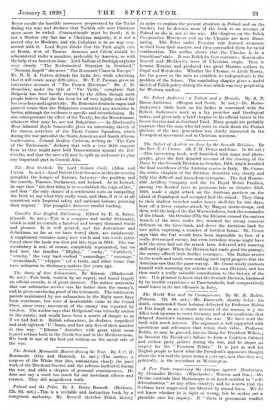SOME BOOKS OF THE WEEK.
[Notice in phis wham does not necessarily preclude subsequent reeists.]
THE J_A.NUARY Hoe-relles.—The Nineteenth Century gives prominence to a most appreciative article by Lord Ernie on " The Women's Land Army," founded in 1917 and demobiEzed last November. Three-fourths of the women who stayed to the end wished to remain on the land. Sir Ernest Hatch, dis• cussing "The Uprising of Labour," proposes a Coalition between Labour and the Independent Liberals as an alternative Govern. meat. Major Gerald Hurst, on the other hand, maintains that " the majority of English people have passed out of the old classification of party politics " and desire nothing better than the present Coalition. Mr. G. A. B. Dewar puts the case of our disabled officers very clearly and forcibly as " A National Debt of Honour." Professor J. Y. Simpson, writing on " Russia and the Allied Policy," assumes the impending collapse of Bolshevism, and declares that the Allies need to agree on the establishment of a Russian Confederation, including the border States. Mr. John Pollock attributes the failure of General Yudenitch to take Petrograd to his military mistakes, and to hi; failure to secure help from Finland, Esthonia, and the Allies. General Charteris, who was Lord Haig's secretary in France, contributes a valuable article on his old chief's despatches, and points out that the whole responsibility for the decisive British attack on the Hindenburg Line rested with Lord Haig. Mr. Herbert Baker gives some interesting reminiscences of Cecil Rhodes, and Mr. Alexander Carlyle prints a hitherto unpublished essay on " Christopher North " written in 1868 by Thomas Carlyle.—In the Fortnightly Mr. James M. Beck has an im- portant article on " The League of Nations and Anglo-American Unity." He protests strongly against the suggestion that America has repudiated her promises. " The European nations had ample and exceptional warnings that the American peace representatives had no authority to commit their country to any Treaty obligations." He denies that the Senate majority- is actuated mainly by partisan motives in its opposition to the Covenant. " Fortunately," he adds, " even the folly of the League of Nations cannot destroy the strong foundation upon which the Anglo-Franco-American Entente now rests." Mr. J. D. Whelpley, in an instructive article on " War Reactions in America," seems to think that the Senate will pass the Treaty with no serious reservations. Sir Oliver Lodge criticizes Professor Einstein's theory and maintains his own standpoint in an article on " The Ether versus Relativity." Mr. H. J. Jennings considers " The Next Budget—and After," and de- clares that the only remedy for our troubles lies in " reducing Government waste and the cost of living" and in cutting down the mass of paper money. " Behind the Scenes at Bjorkoe and After," by the late Alexander Iswolsky, is an account of the dealings between the late Tsar and the ex-Kaiser that differs widely from Dr. Dillon's version given on the authority of the late Count Witte. Mr. Frederic Harrison, indefatigable as ever, begins a new monthly article entitled " Novissima Verba."—The Contemporary opens with a weighty article by Lord Bryce on " The Settlement- of the Near East." LOH.
Bryce recalls the horrible massacres perpetrated by the Turks during the war, and declares that Turkish rule over Christian races must be ended. Constantinople must be freed ; it is not a Moslem city but has a Christian majority, it is not a sacred city to Moslems, and the Caliphate is in no way con- nected with it. Lord Bryce thinks that the Turk might rule at Konia, west of Taurus. Armenia and Cilicia should be administered under a mandate, preferably by America, or with the help of an American loan. Lord Balfour of Burleigh explains very clearly " The Ecclesiastical Situation in Scotland." " Norman Angell " discusses " The Economic Chaos in Europe." Mr. H. E. A. Cotton defends the India Act, while admitting that it will create many difficulties. Mr. T. F. Farman gives an instructive account of " The French Elections." Mr. J. D. Bourchier, under the title of Vae Victis," complains that Bulgaria has been hardly treated by the Allies, though most people believe that she has been let off very lightly indeed for her treachery and ingratitude. Mr. Bourchier denies in vague and general terms that the Bulgarians committed any atrocities in Serbia, although the evidence is specific and overwhelming. He also misrepresents the effect of the Treaty, for the Macedonians. whatever they may be, are not Bulgarians.—In Blackwood's Rear-Admiral Boyle Somerville gives an interesting sketch of the unseen activities of the Ninth Cruiser Squadron, which during the war patrolled the South American and South African trade-routes. Colonel Dudley Carleton, writing on " The Fate of the Turkomans," declares that with a very little support from us they might have held Transcaucasia against the Bol- sheviks, and that the race will now be split up and cease to play any important part in Central Asia.











































 Previous page
Previous page